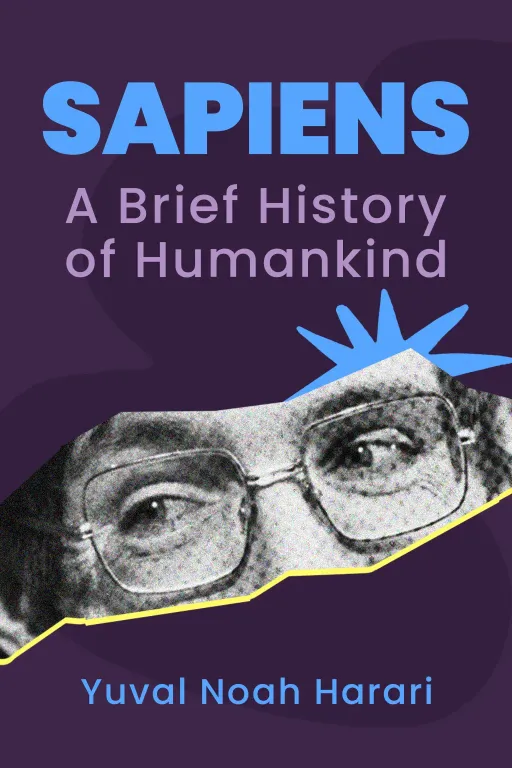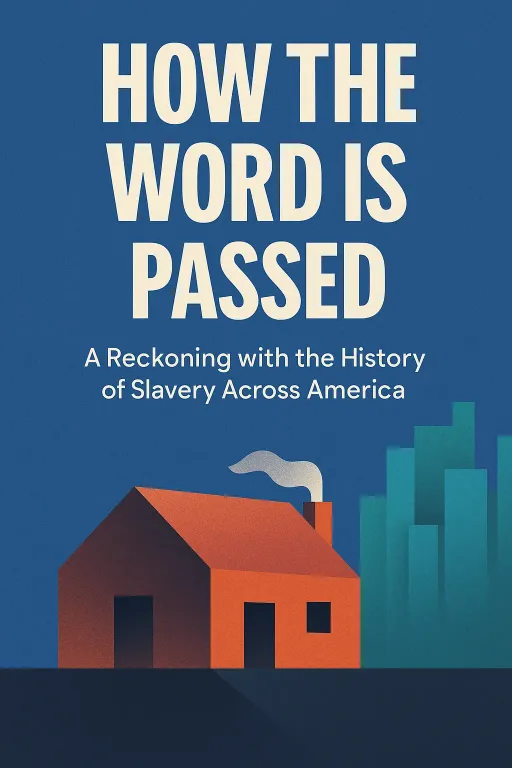
Sapiens: Our Fictional Superpower
10 minA Brief History of Humankind
Golden Hook & Introduction
SECTION
Michael: Alright Kevin, you've made it through Sapiens. Give me your five-word review. Kevin: Apes, gossip, money, anxiety, repeat. Michael: That's… surprisingly accurate. Mine would be: "Imagination is our only superpower." Kevin: I like that. It’s a bit more optimistic than mine. My version ends with us being anxious messes, yours ends with us being superheroes. Michael: Well, that's the perfect entry point for today's book. We are diving into Sapiens: A Brief History of Humankind by Yuval Noah Harari. And it's fascinating—this book became a global phenomenon, praised by everyone from Bill Gates to Barack Obama, but it actually started as a series of undergraduate history lectures in Israel. Harari just wanted to make the grand sweep of history accessible. Kevin: So it's basically the world's most successful university course. And it definitely kicks off with a bang, with this core idea that our biggest strength isn't our big brains or our fancy tools, but our ability to… well, to make stuff up.
The Power of Make-Believe: How Shared Fictions Conquered the World
SECTION
Michael: Exactly. He calls it the Cognitive Revolution, which happened around 70,000 years ago. And the key development wasn't just language, but a specific kind of language: the ability to talk about things that don't physically exist. Kevin: Okay, hold on. So you mean like lying? I can talk about the unicorn I rode to work this morning. Is that what made us special? My ability to be a convincing liar? Michael: It's much bigger than that. It's not just about lying, it's about creating entire realities that people collectively believe in. Harari’s classic example is a corporation. Think of a company like Google. Where is it? You can't physically point to it. It's not its buildings or its employees or its servers. It's a legal fiction, an idea that we all agree exists. And because we agree, it can own property, sign contracts, and employ millions of people. Kevin: Huh. So you're saying Google only exists because we all agree it does? That feels a little… philosophical when my YouTube Premium bill is very, very real. Michael: But that's precisely his point! The fiction has real-world power. And this, he argues, is what gave Homo sapiens a decisive edge. Let's go back 50,000 years. Imagine a valley with a band of Neanderthals and a tribe of Homo sapiens. Kevin: Alright, setting the scene. The Neanderthals are probably bigger, stronger, and have larger brains. They should win, right? Michael: On paper, yes. But a Neanderthal group can only cooperate effectively up to about 50 individuals, the number of people you can know intimately. They rely on personal trust. Any larger, and social order breaks down. Kevin: Okay, I can see that. It's like trying to organize a group project with more than four people. It’s chaos. Michael: But the Sapiens tribe is different. They can cooperate in groups of 150, 500, even thousands. Why? Because they share a common myth. They might all believe in a great lion spirit that protects their tribe, or a story about a sacred mountain. This shared belief, this "imagined reality," allows complete strangers to trust each other and work towards a common goal. Kevin: Wow. So while the Neanderthals are stuck in small, family-based bands, Sapiens are building the first proto-nations based on a good story. That’s a powerful idea. It’s basically the difference between a local garage band and a global fanbase like the BTS ARMY. The band is the people, the ARMY is the story. Michael: That's a perfect modern analogy. And Harari argues this applies to almost everything that structures our world today: money, laws, nations, justice, human rights. They are all imagined orders. Kevin: This is where some people start to get uncomfortable, though. I know some academics and critics have pushed back, saying Harari is a brilliant storyteller, but he's taking these huge speculative leaps and presenting them as historical fact. They label it 'infotainment.' Michael: That's a fair critique, and he does paint with a very broad brush. He's synthesizing history on a massive scale, and some nuance is inevitably lost. But the core idea—that our ability to create and sustain these fictions is our unique trait—is incredibly compelling. It reframes our entire history. We didn't conquer the world with spears; we conquered it with stories. Kevin: It's a bit of a downer, though, isn't it? To think that the things we hold most sacred, like justice or freedom, are just… made up? It feels like he's pulling the rug out from under everything. Michael: He might say he's just showing us that the rug was never really there to begin with. But the power is real. A piece of paper with a dead president on it is worthless, but because we all believe in the story of "money," it can buy you food and shelter. The story is what matters.
The Sibling Rivalry: What Really Happened to Our Human Cousins?
SECTION
Kevin: Okay, so this storytelling superpower made us incredibly effective cooperators. How did that play out when we met other humans? Because the book makes it clear we weren't the only game in town. Michael: Not at all. And this is one of the most mind-blowing parts of the book for many people. For most of our species' history, Earth was home to several different human species at the same time. It was like a real-life Lord of the Rings, with different human types spread across the globe. Kevin: You had the stocky, cold-adapted Neanderthals in Europe and Asia, the mysterious Denisovans in Siberia, and even the tiny, one-meter-tall Homo floresiensis—nicknamed 'Hobbits'—on an island in Indonesia. What on earth happened to them all? Michael: That is the great prehistoric mystery. Harari lays out two main theories that have battled for dominance over the years. The first is the "Interbreeding Theory." This is the romantic version. As Sapiens spread out of Africa, they met their Neanderthal and Denisovan cousins, they fell in love, and they merged together. Kevin: Aww, a prehistoric love story. So modern humans are a mix of all these ancient populations. I like that. It feels inclusive. Michael: The other theory is the "Replacement Theory." This one is much darker. It suggests that Sapiens and other humans were too different—genetically, anatomically, maybe even in their mating habits. Cooperation was impossible, and as the more resourceful and numerous Sapiens moved in, they outcompeted the others for food and resources, driving them to extinction. Kevin: So, either a love story or a genocide. That's quite a range of possibilities. Which one does the evidence support? Michael: This is where science delivered a stunning plot twist. In 2010, geneticists finished mapping the Neanderthal genome. They compared it to modern human DNA, and the results were shocking. Kevin: Let me guess, they found a match? Michael: They did. Modern humans of European and Middle Eastern descent have, on average, between 1% and 4% Neanderthal DNA. A few years later, they mapped DNA from a fossilized finger found in Denisova Cave in Siberia and found that modern Melanesians and Aboriginal Australians carry up to 6% Denisovan DNA. Kevin: Whoa. So it's not one or the other. The answer is both. We replaced them, but not before… interbreeding with them. That's a messy, complicated family history. Michael: Incredibly messy. It means that for some period of time, Sapiens and Neanderthals could produce fertile offspring. But the fact remains that after a few thousand years of contact, the Neanderthals were gone. Forever. The replacement was near-total. Kevin: So even if there were some love stories, the bigger picture looks more like a conquest. Harari doesn't pull any punches on this, does he? He basically asks if the final disappearance of the Neanderthals was the first and most significant ethnic cleansing in history. Michael: He does. He forces you to confront that possibility. Our species, the one that prides itself on art and philosophy and justice, may have started its global reign by wiping out its closest relatives. It's a profoundly unsettling thought. We are, as he says, "full of fears and anxieties over our position, which makes us doubly cruel and dangerous." Kevin: Like a banana republic dictator. That quote stuck with me. We're the insecure underdog who clawed our way to the top, and we've been terrified of losing that spot ever since.
Synthesis & Takeaways
SECTION
Michael: And that's how the two core ideas of the book lock together so powerfully. Our unique ability to create shared fictions—our superpower—allowed us to cooperate on a scale no other animal could. But when that superpower was unleashed on a world with other human species, the outcome was decisive and, perhaps, tragic. Kevin: It’s a really humbling perspective. We're not at the top of the food chain because we're the strongest or even the smartest in a raw-intelligence sense. We're here because we're the planet's most effective believers. We believe in gods, in money, in nations, in our favorite sports teams… and that belief changes the world. Michael: But it also raises that profound question you touched on earlier. If our laws, our morals, our entire economic system are all just stories we collectively agree to believe in… what happens when we stop believing? Or when we decide to tell a different story? Kevin: That's the core challenge Harari leaves us with, isn't it? He says, "The entire planet becomes a single historical arena." We're all part of the same global story now, for better or worse. The real question is what kind of story we want to write for the next chapter. Michael: It's a massive responsibility. And reading Sapiens makes you feel the weight of it. It fundamentally changes how you see the world and our place in it. Kevin: It really does. It makes you look at a dollar bill, a flag, or a border on a map and see the invisible story holding it all together. A powerful, and slightly terrifying, thought. Michael: And that's the mark of a truly great book. It doesn't just give you answers; it gives you better questions. We'd love to hear what you think. After hearing this, what 'shared fiction' do you believe is the most powerful force in the world today? Let us know on our social channels. Michael: This is Aibrary, signing off.









